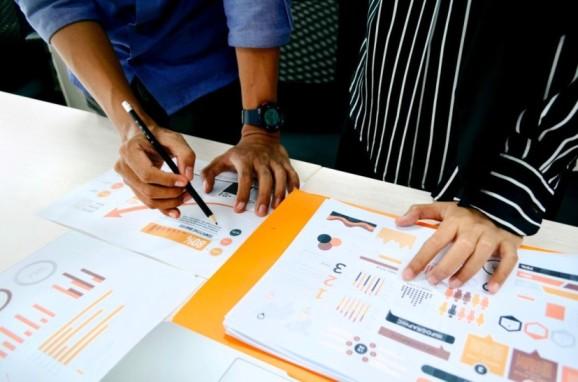What are soft skills?
Soft skills, or transferable skills, as many call them, are personal traits and social abilities that help work with others effectively. Read through our soft skills guide for examples, tips and top soft skills interview questions.

Our customers have been hired by: *Foot Note
Soft skills are important personal attributes that help you navigate the workplace and build strong relationships with colleagues, clients, and managers. Demonstrating these abilities is likely to improve your chances of landing a job.
In this article, we’ll explain what soft skills are, explore their key examples, and tell you why these abilities are important in the workplace. Below, you’ll also find useful tips for improving your soft skills for ultimate success during recruitment and at work.
What are soft skills?
Soft skills, also known as transferable skills, are personal and social abilities that help you work effectively with others. Unlike hard skills (which are typically job-specific and very technical), the same soft skills can be applied across almost any profession.
Employers value candidates who demonstrate strong soft skills because those people are more likely to contribute to a positive work environment. While technical skills can be taught, soft skills often reflect a person’s character and ability to work well as part of a team. Therefore, a well-rounded candidate with strong soft skills is usually more adaptable and effective in diverse job settings.
What’s the difference between hard skills and soft skills?
As you already know, soft skills are personal and interpersonal abilities that you use to interact with others. Examples of soft skills include communication, teamwork, and critical thinking. Hard skills, on the other hand, are technical abilities, which you can learn through education or training. Examples of hard skills include programming, data analysis, and language proficiency.
The main difference between soft skills and hard skills is that hard skills are measurable, while soft skills are more abstract and often depend on a person’s emotional intelligence. While hard skills are crucial for performing specific tasks, soft skills are essential for building relationships, navigating workplace dynamics, and adapting to changing situations.
Top soft skills examples
Given the multitude of applications of soft skills, employers also value them. That is why when you’re writing your CV, it’s worth adding them to your skills section.
Here are the top soft skills examples:
Communication
Communication is the ability to convey ideas and thoughts effectively. The ability to communicate involves many aspects, from spoken (verbal) communication to written and non-verbal communication. This includes body language, facial expressions and the ability to maintain eye contact.
Good communication skills can make all the difference when you need to make sure you're understood by your colleagues, managers, or clients. This soft skill will help you build strong relationships in the workplace and ensure clarity in meetings or reports.
Teamwork
Strong teamwork skills are essential in almost every job. Their role is to help you work effectively together, manage conflict, and contribute to a productive working environment. At its core, teamwork is about recognising your own strengths and weaknesses - as well as those of others.
Someone with strong teamwork skills knows not only how to communicate, but also how to give and receive feedback. Ultimately, true collaboration is built on key values such as empathy, mutual respect and creativity, all of which help to foster strong, successful teams.
Leadership soft skills
Developing leadership skills teaches you how to organise the work of a team and inspire others to work towards a common goal. But great leadership goes beyond managing people - it’s about being decisive, empathetic, and able to delegate effectively while motivating those around you.
A strong team leader focuses not just on performance, but on the well-being of the team itself. This demanding role requires a mix of other soft skills, including decisiveness, assertiveness, empathy, respect, and approachability.
Attention to detail
Attention to detail is a soft skill that reflects a person’s ability to work accurately, thoroughly, and carefully. It involves focusing on the finer aspects of a task to minimise errors and ensure high-quality results. Employees with strong attention to detail are often seen as reliable, hardworking and highly organised, which improves efficiency and overall performance in the workplace. This skill is particularly important in fields such as healthcare, finance, or engineering.
Critical thinking
Critical thinking involves evaluating situations, analysing information, and making logical, informed decisions. It combines observation, problem-solving, reasoning, active listening, and communication.
By being a good critical thinker, you’ll find it easier to break down complex problems and find effective solutions for them. This makes critical thinking a key soft skill and a huge asset in any workplace.
Adaptability
In our fast-changing world, the ability to adapt is more important than ever. Organisations value employees who can adjust to new situations without sacrificing productivity, for example, when it comes to shifting from on-site to remote work or learning new software.
By developing your adaptability skills, you'll understand that change is inevitable - but those who approach it with flexibility and a problem-solving mindset are the ones who thrive and succeed.
Decision-making
Decision-making is the process of analysing all the available options and choosing the best course of action in a situation. Making good decisions requires you to listen carefully, analyse the details and trust your judgement. Ultimately, strong decision-making helps you overcome challenges and move forward with clarity.
Problem solving
Problem-solving is the process of noticing a problem, identifying its causes, and introducing a solution. For it to work as smoothly as it does in theory, it requires a combination of skills: observation, communication, active listening, and mediation. Problem solving is an important characteristic that most recruiters (and especially those hiring for management and leadership positions) look for in candidates.
Time management
Time management is the ability to plan and control how you spend your time to work efficiently and productively. It applies not only to your own schedule but also to coordinating the time of others. Strong organisational and time management skills are essential for planning tasks, setting priorities, and maintaining productivity.
In the workplace, effective time management is about more than meeting deadlines - it's about prioritising tasks, delegating when necessary, and ensuring you have time to work and rest.
Other soft skills
In addition to the soft skills mentioned above, there are several other important transferable attributes you can develop to improve your effectiveness at work. These additional skills will help you navigate challenges and improve collaboration:
- Mediation
- Negotiation
- Punctuality
- Work ethic
- Honesty
- Ability to compromise
- Coping with stress
- Approachability and tolerance
- Creativity
- Resourcefulness
- Curiosity and willingness to learn
- Ability to maintain a work-life balance
- Assertiveness
- Compliance with rules
- Networking
Always tailor the soft skills section of your CV to the job description. For example, if the job requires adaptability, mention how you successfully adapted to new software or responsibilities. You can check out our professional CV examples to see how to do this effectively.
Importance of soft skills in the workplace
Soft skills are essential if you want to improve your personal effectiveness and contribute to creating a thriving workplace. If you’re looking for a new job, it’s also important to showcase these skills at all stages of the recruitment process – in your CV, cover letter, and interview – to demonstrate your ability to contribute effectively to the organisation.
Here are some key reasons why transferable abilities are important in the workplace:
- Enhancing collaboration: Strong soft skills help you work well as part of a team, contributing to a positive work environment and promoting effective teamwork.
- Improving interpersonal relationships: Interpersonal skills allow you to build strong professional relationships, increasing trust between you and your colleagues.
- Supporting conflict resolution: These skills also help with navigating and resolving conflicts effectively, allowing you to maintain a harmonious work environment.
- Increasing adaptability: Soft skills make it easier for you to adapt to changes, whether it’s shifting team dynamics or evolving job responsibilities.
- Promoting professional growth: Soft skills play a significant role in career advancement, as they help you stand out and demonstrate leadership potential.
Soft skills CV examples by profession
Soft skills are applicable to any industry, and adding them to your CV can make you stand out. Here are examples of relevant soft skills by profession:
Soft skills examples for an accountant
Accountants use soft skills to manage their workload and build trust with clients. Here are the key transferable skills for an accountant CV:
- Integrity and high work ethic
- Attention to detail
- Good communication (both verbal and written)
- Customer service
- Time management
Soft skills examples for a receptionist
If you work as a receptionist, you can use your soft skills to create a welcoming atmosphere and manage administrative tasks smoothly. Here are some important transferable skills for receptionists:
- Kindness and approachability
- Excellent communication
- Great phone etiquette
- Good memory of names and faces
- Multitasking
Soft skills examples for a banker
Bankers use soft skills to assist clients and maintain a professional, efficient environment. Their key soft skills include:
- Strong verbal and written communication
- Negotiation skills
- Assertiveness and eloquence
- Time management
- Ability to perform well under pressure
Soft skills examples for a construction worker
Construction workers need soft skills to work well as part of a team and to ensure that project objectives are met on time and safely. Their key soft skills are:
- Dependability and responsibility
- Attention to detail
- Time management
- Adaptability to different conditions
- Creative thinking and problem-solving
Soft skills examples for a nurse
Daily, nurses care for patients, helping them during emergencies and other stressful situations. They also use their soft skills to work smoothly within healthcare teams. Their critical transferable skills include:
- Empathy and patience
- Good verbal communication
- Ability to work in stressful situations
- Good organisational skills
- Critical thinking
Soft skills example for a personal assistant
Personal assistants use soft skills to stay organised, prioritise tasks, and effectively support their leaders. To exceed in this role, consider developing the following soft skills:
- Adaptability
- Excellent oral and written communication
- Time management
- High work ethic and confidentiality
- Resourcefulness
How to improve soft skills

A fundamental part of soft skills training is analysing and identifying skill gaps. Even after that, it's important to realise that developing soft skills is an ongoing process that takes time and practice. Here are some practical steps you can take to improve your interpersonal skills and set yourself up for success in the workplace:
Step 1:
Participate in soft skill courses
Online courses or in-person workshops are great for improving soft skills such as communication, leadership, and teamwork. Many e-learning platforms, such as Udemy or Coursera, offer courses tailored to specific industries, so you can focus on developing the skills most relevant to your career. These courses often expose you to real-life scenarios and exercises to help you apply what you've learned.
Step 2:
Ask for feedback
Constructive criticism from people you know - including colleagues and mentors - is invaluable in identifying your key areas for improvement. Don’t be afraid to ask for feedback after a meeting or presentation. Ask specific questions, such as “What could I have done better in this situation?” and be open to both positive and negative feedback. This can help you identify specific soft skills that you want to improve to progress in your career.
Step 3:
Practise open communication
Communication is at the heart of most soft skills, so it’s important to find opportunities to practise both verbal and non-verbal communication. Taking part in conversations, giving presentations, or networking with others - all of these activities will help you to refine the way you express yourself. The more you practise, the more natural and effective your communication will become.
Step 4:
Observe and learn
Observing how successful people handle situations can provide valuable insights for developing your own approach. Pay attention to how others deal with conflict, make decisions, and work as part of a team. This can help you understand how to handle similar situations more confidently and effectively.
Top 10 soft skills interview questions
During interviews, recruiters often assess soft skills through a mixture of common interview questions and behavioural questions. Here are some variations of common soft skills questions that you can prepare for when you’re interviewing for a job:
- Give an example of conflict in the workplace and how you dealt with it.
- Describe how you would behave when a teammate challenged your decision.
- Describe how you would resolve a conflict with a problematic client.
- How do you prioritise your tasks?
- Do you prefer to complete one task long but thoroughly or several tasks quickly but inaccurately?
- How do you behave when you notice that a teammate has made a critical error?
- Describe a failure you had at work and what it taught you.
- Give an example of a creative, out-of-the-box solution you implemented at work.
- Give an example of how your working conditions changed during the lockdown and how you adapted to them.
- What is important to you when working in a team?
Conclusion
Based on the above soft skills examples, we can conclude that soft skills are as important as the importance of hard, technical skills in the workplace.
Unlike technical skills, which are specific to certain tasks, soft skills are valuable in any role.
Soft skills are transferable, which means that they are applicable in many situations.
Recruiters pay a lot of attention to skills on a CV and often ask soft skills interview questions similar to those above.
If you want to develop your skills, join a soft skills course or observe how others use these skills to succeed. Practice networking, try to have a good attitude, and open up to other people. This is the best start!

Olga Knapinska
Content writer
Olga Knapinska is an experienced content writer and recruitment marketing specialist with a strong commitment to diversity and inclusion (D&I). With a background in career advice, she thrives on helping individuals navigate today’s dynamic job market and discover unique, non-traditional career paths. She’s passionate about equipping people with the right tools to understand and grow their potential as they work towards professional and personal growth.
*The names and logos of the companies referred to above are all trademarks of their respective holders. Unless specifically stated otherwise, such references are not intended to imply any affiliation or association with myperfectCV.











